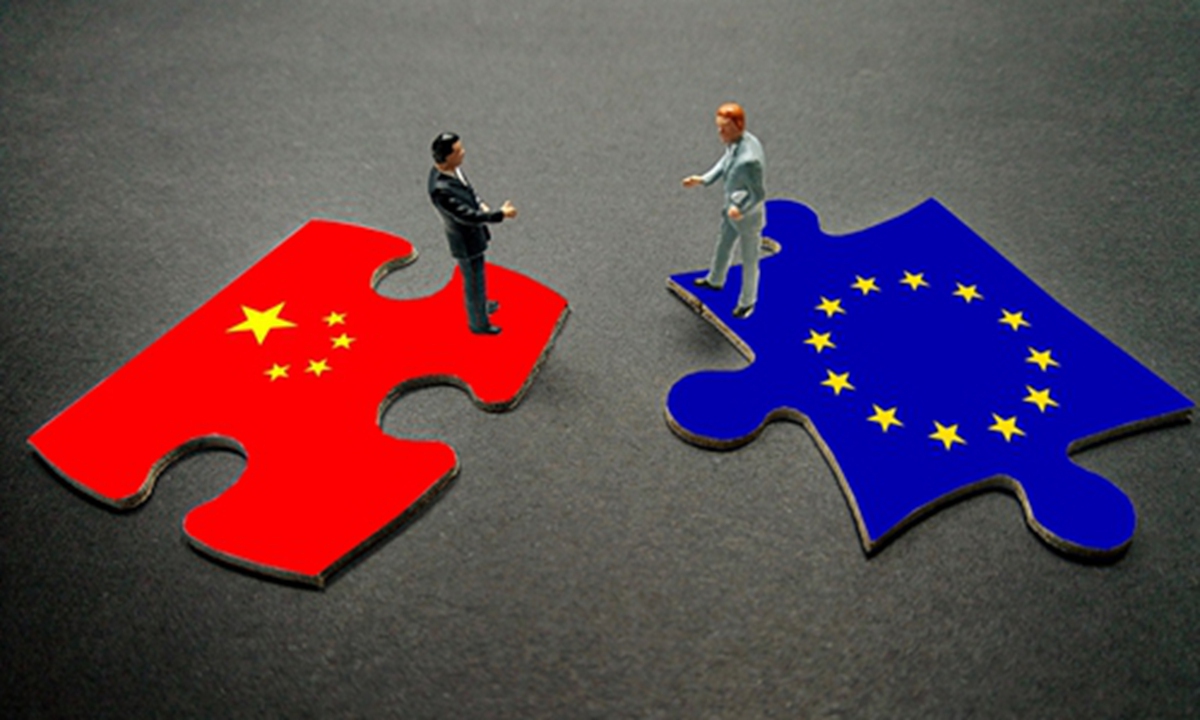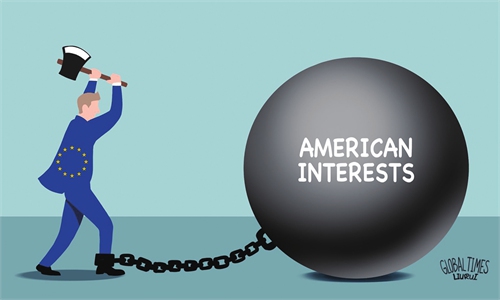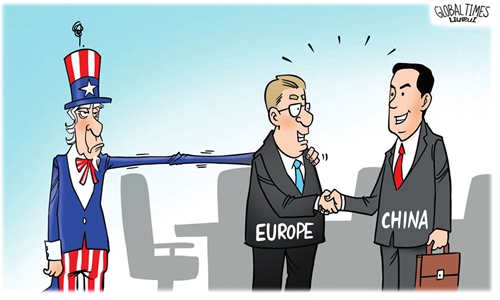'Decoupling from China' push exposes absurdity of some Western politicians' zero-sum thinking: Italian scholar

China-EU relationship Photo: VCG
Editor's Note:"The 'decoupling from China' theory violates economic laws and is detached from objective reality. It exposes the absurdity of some Western politicians' zero-sum thinking, which is nothing but the fallacy of harming others and themselves in favor of third and distant interests," said Giancarlo Elia Valori (Valori), an Italian expert on international affairs, in an interview with Global Times (GT) reporter Yu Jincui. After a wave of China visits by European leaders, where will China-Europe relations head? What's the fallacy of "decoupling from China" theory and how will the Europe maintain and enhance its strategic autonomy? The Italian professor shared his views.
GT: The past few weeks have witnessed a wave of China visits by European leaders such as Spanish Prime Minister Pedro Sánchez, French President Macron, European Commission President von der Leyen and other high-ranking European political figures. Given the recent intensive interactions, do you feel positive for a thawing relationship between China and the EU?
Valori: I think that more than talking about relations between China and the EU, we can speak of excellent relations between European countries and China. The visits of French President Macron, Spanish Prime Minister Sánchez, and President of the European Commission Ursula Gertrud von der Leyen, as well as Luxembourg's positive statements, indicate steps by these states toward China, and not of the EU as a whole, which is an incomplete and amorphous institution in itself, with the countries inclined to pursue US' interests and willing to confirm the nuclear protection of the White House, as in the "good days" of the Cold War.
GT: After visiting China, Macron has reiterated a call for the EU to implement its stated policy of "strategic autonomy" and rejected "decoupling" from China. What is the fallacy of the "decoupling" theory?
Valori: Following the US in seeking decoupling from China is an indication of EU abandoning its strategic autonomy.
Since the beginning of 2022, some political and economic forces in the US and the West have joined forces with the media to vigorously encourage Western companies to "decouple from China" and sometimes claim that China's economic fluctuations are "worrying." When they advocate "decoupling from China," they do their best to downplay the global status of the Chinese economy. When they claim that the Chinese economy is dragging the world down, they talk about China's international influence. This inconsistent "decoupling theory" violates economic laws and is detached from objective reality. It exposes the absurdity of some Western politicians' zero-sum thinking, which is nothing but the fallacy of harming others and themselves in favor of third and distant interests.
The defence of the "decoupling theory" is precisely rooted in the zero-sum thinking of some think tanks in the West. They cannot tolerate the success of non-Western development models, and consider China as a competitor rather than a partner. They use "decoupling" as a new weapon against China.
Sourabh Gupta, a senior researcher at the US-based Center for China-US Studies, pointed out that a small number of Western countries promote "decoupling" to contain China. Their obsession with zero-sum thinking is exactly the same as during the Cold War. Today, however, Western countries and China share many common interests, and it is therefore not in the interest of all parties to address economic and trade relations with China with a zero-sum mentality.
The problem is that on the issue of economic development, the US and the West have always bragged about the "respectability" of the market economy, selling the Western model as the "only" truth of development, accustomed to hegemony, and seeking to make profits from it by negatively influencing the development of other countries. Once other countries aligned with the West try to refuse to conform, they will be discredited and isolated, as well as labelled as a "non-market economy" and "distorted competition." Here lies the terror of some European countries to act independently and hence the EU's motionless existence.
GT: After the Nord Stream sabotage, some analysts believe that Europe no longer shares so many common interests with the US, and the US is eroding Europe's interests. How do you view this argument?
Valori: In the blink of an eye, over a month has elapsed since Seymour Hersh, the well-known American journalist and 1970 Pulitzer Prize winner, reported that the US was behind the sabotage of the Nord Stream natural gas pipeline. Hersh has recently spoken out and broken the news. In the face of these facts, the servile Western politicians and the mainstream media have been so silent that Claire Daly from Ireland, a member of the European Parliament, said that "hardly anyone has uttered a word," which made her ashamed.
Once it was confirmed that the Nord Stream bombing was induced by the US, the embarrassment fell on the EU. Hersh's revelations raise questions as to whether the West really wants to stop the war, and they also raise doubts among European citizens about the true intentions of the so-called West on the Russia-Ukraine conflict.
A number of statements also by the Swedish Transnational Peace and Future Research Foundation clearly point to the fact that economic sanctions against Russia and the destruction of the Nord Stream pipeline have caused and continue to cause enormous damage to the European economy. A lecturer at the Autonomous University of Barcelona said that the US is the biggest beneficiary of the destruction of the Nord Stream as, by breaking Germany's dependence on Russian natural gas, the US seizes the opportunity to sell more liquefied natural gas to Germany.
It is now clear that since 2001 the West has been advocating the use of harsh measures, including force, to impose itself, relying on the use of weapons, threats, covert operations and media manipulation, rather than talks, mediation and diplomacy. The silence on Hersh's revelations explains the EU situation as being a sort of colony, but fortunately, there is growing willingness of many Western European countries to try to break away from their overseas master.
GT: When it comes to the Russia-Ukraine conflict, what kind of common interests do the Europe and China share?
Valori: European societies, media, foreign policy scholars and citizens have recently started discussing China's proposal for a peaceful and political solution to the Russia-Ukraine conflict. This could be a turning point in the Russia-Ukraine conflict. Some people in Europe have even suggested that Russia and Ukraine could go to China for talks. These are obviously only proposals at the moment, and are still far from concrete implementation. But this has also been raised as a possibility. If Russia and Ukraine really go in this direction, the US is bound to face a challenge to its global hegemony - hence it would be the first to oppose a peace proposal coming from Far East Asia.
The political solution to the Russia-Ukraine conflict that the Europeans are currently discussing is a political necessity for Europe, as the EU strongly hopes to achieve a good solution to the Russia-Ukraine ceasefire and eliminate the impact of the Russia-Ukraine conflict that only harms Europe, and favors the US for the issues related to oil and arms sales to the parties. Therefore, the common interests that Europe and China share in ending the war, are instrumental to Europe's desire for peace in/on trade. Europe takes this proposal very seriously, but the aforementioned terrorist attacks such as the one against the Nord Stream gas pipeline, surely cannot stop anytime soon.
GT: What do you think of China's proposed 12-point peace plan? How do you think the Europe should respond to it?
Valori: From the perspective of Russia and Ukraine, China provides them with a plan for a peaceful framework, which is itself a reaffirmation of traditional Chinese diplomacy. It is also an attempt by China to put the parties on an equal footing - an initiative coming from a country far from the conflict that is neutral and genuinely interested in ending the conflict.
As far as Europe is concerned, I repeat that the individual states - Germany, Spain, France, the Northern countries, etc. - have the means to intervene as mediators, while the EU itself - lacking a military defence apparatus - is meaningless as a decision-maker.


